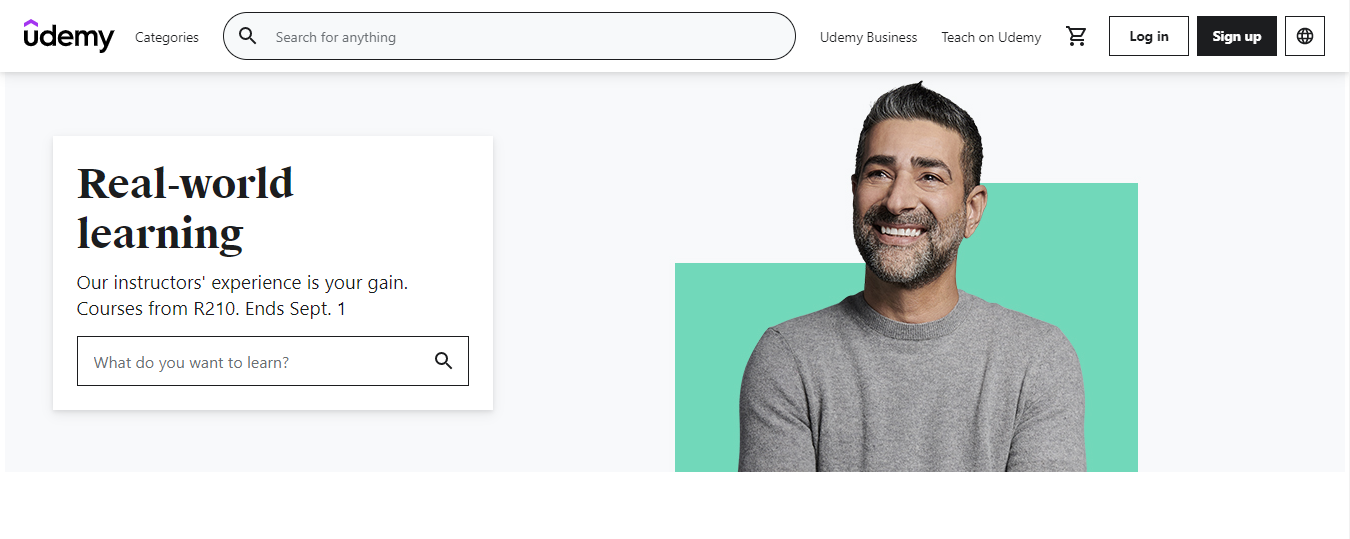Table of Contents
Udemy vs edX: an Overview
There are numerous online course providers, and people are often torn between Udemy vs edX. This article will compare the two websites and tell you which one is more suitable for your needs as a part-time or full-time learner.
Udemy is a relatively inexpensive learning platform that lets you learn at your own pace through a straightforward format. There’s a huge number of courses available, catering to an array of interesting topics. The instructors come from different organizations and industries to provide a unique experience with each module.
In contrast, edX takes a more in-depth approach to its courses. The courses were developed in collaboration with renowned universities, confirming the company’s legitimacy. Most of the content is of exceptionally high quality, and the curricula resemble college courses.
Udemy vs edX: Who Is It For?
Udemy
Udemy is an excellent choice for students who want to learn a wide range of skills. It’s also a good choice for learners who are short on time.

Due to the pay-as-you-go format, there’s no need to worry about costly subscriptions. You only pay for the courses you like. Accordingly, you can spend as much time as necessary on your module to ensure you acquire the desired skills.
Additionally, Udemy works well for people willing to invest extra effort into determining which courses suit them. As the platform doesn’t curate its learning materials, you can expect varying quality from the third-party teachers who upload them. If you don’t mind doing some extra research to find the right course, you should enjoy your stay at Udemy.
You can also benefit from this platform if you purchase your courses during sales. Udemy offers various discounts throughout the year, and you can sometimes get up to 90% off if your timing is perfect. Again, you’ll need to do some legwork to make the most of this feature.
On top of that, Udemy is excellent if you’re looking for courses for varying skill levels. It features a vast number of modules suited to different ambitions and skillsets. This diversity makes Udemy open to anyone, regardless of your prior experience.
Finally, teachers should also consider using Udemy. If you want to make more money by hosting online classes, this is the platform for you. They provide transparent payments and referral codes, allowing you to earn even more per registration. The competition may be stiff though, as more than 70,000 teachers are on the website, but it’s still a terrific way to supplement your monthly income.
edX
edX is primarily geared toward students who are searching for official, higher-education courses. This eLearning platform is home to over 300 programs and interactive online courses created alongside the world’s best organizations, colleges, and universities. Hence, if you’re looking for accredited modules with verified certifications and degrees, you can’t go wrong with edX.

Moreover, you can gain a lot from edX if you’re a serious learner. The subjects are more comprehensive than Udemy’s, whether you’re into computer science, engineering, design, or business. Their modules are similar to university courses, making them highly demanding.
However, you should stick to Udemy if you’re more interested in exploring a broader range of subjects.
Udemy vs edX: Types of Courses Offered
Udemy
Udemy features more than 150,000 courses with over 110 million minutes of learning materials. The wide array of modules are divided into the following categories:
- Business
- Development
- Finance and Accounting
- IT and Software
- Office Productivity
- Design
- Personal Development
- Lifestyle
- Marketing
- Photography and Video
- Music
- Health and Fitness
- Teaching and Academics
From there, you can access several additional categories. For instance, the Lifestyle section contains Pet Care and Training, followed by Horsemanship and Dog Training. Each category is vast, enabling you to explore all kinds of courses.

You can even convert some Udemy content to both college and job credits. Most courses offer a Udemy certificate of completion, but none of them are accredited. Therefore, they can only help you improve your odds of landing a job through the acquisition of practical skills.
edX
The most significant benefit of edX is that it’s an accredited institution. The platform is made up of more than 2,500 courses that cover several subjects. Some of the most popular options include:
- Architecture
- Biology
- Business and Management
- Chemistry
- Design
- Computer Science
- Food and Nutrition
- History
- Language
Their courses don’t have specific prerequisites, but some of them are more demanding than others. You should read your course descriptions before registering to find out the knowledge necessary to follow the lectures.

The biggest downside of edX education is that most courses don’t provide academic credit for free. Some classes are credit-eligible, but you’ll need to purchase the credit and apply it toward your university degree. To do so, you’ll need to choose the Verified Track upon enrolling and complete your course requirements within one year.
While there are some free edX courses, they won’t reward you with certificates. You’ll need to pay a fee of between $50 and $300 to obtain one. Archived courses don’t offer certificates, either.
There are also two types of certificates. A verified edX certificate is earned for reaching a particular mark on your verified track. Conversely, you’ll need to obtain verified certificates for each course in your program to acquire program certificates.
If you’re only interested in accredited programs, you might want to stick to edX’s Master’s degrees courses. They’re recognized by many renowned universities, such as Purdue University, the University of Queensland, and the University of Texas.
Udemy vs edX: Pricing and Refunds
Udemy
Udemy’s individual courses go for between $11.99 and $199.00. But in most cases, you get sizeable discounts, and the final price can sometimes be discounted by as much as 90%.
There are also courses for businesses under the Team plan that cost $360 per user. The price of the Enterprise plan and Leadership Development Programs depends on the number of users and is customizable.
Certain jurisdictions don’t have access to the free trial option, and it’s only available to new subscribers. For example, if you’ve previously used your Personal Plan, you won’t qualify. The good news is that there are more than 600 free courses on Udemy.
If you’re not happy with your Udemy course, you can get a refund within a month of your purchase.
edX
The price of edX courses varies drastically. The classes in your verified track typically go for between $50-$300. Naturally, they’re much cheaper than Master’s degrees, which can range anywhere between $10,000 and $25,000.
While edX doesn’t offer free trials, you can test most of their courses for free. There are also demo classes that let you see how the website works.
To obtain a refund for your verified track course, you need to leave the class within the eligibility period. This is usually two weeks after the purchase date or two weeks after the start of the course.
Keep in mind that you can’t get a refund after earning a certificate.
Udemy vs edX: Enrolment and Usability
Udemy
Udemy is fairly easy to use. Once you visit their homepage, you can quickly search for the desired course using the search bar or via the categories menu. Plus, you can filter the content according to various criteria:
- Topic (data science, web development, software engineering)
- Language (English, Spanish)
- Level (beginner, intermediate, advanced)
- Price (free or paid)
- Features (captions, quizzes, coding exercises)
- Star ratings
- Closed captions
- Video duration

Another great thing about the interface is the intuitive and simple-to-use checkout process. All you need to do is add your course to the cart, sign in, choose your payment method, and start your learning.
Before you finalize your purchase, you can check out the reviews of your courses, too. These allow you to determine whether you’re enrolling in a suitable class.
edX
edX is another user-friendly platform. Users appreciate the simple design of the website because it only contains the necessary information. It doesn’t include annoying popups or trivial details.
Once you enter your course page, you receive the expected information, such as an introductory video and a brief description. Furthermore, there are some basic course details, including the language, price, and length.

The only thing that could be better is the course descriptions. The content itself is sound and informative, but the presentation doesn’t look great. You get a basic format that only consists of a large block of text.
That said, enrolling in an edX course is easy. After finding your preferred class with the search bar, you can click the thumbnail to examine it in-depth. The introduction page will give you all the necessary information. If it’s good to go, hit the Enroll button, and you’ll be all set.
Udemy vs edX: Course Structures
Udemy
Udemy’s course material is pretty extensive. Most classes are broken into dozens of sections, with each one containing an array of materials students can interact with:
- Projects – Some of Udemy’s projects can be completed within a single day, whereas others take five days or longer. As you progress through your course, you typically gain access to more demanding projects.
- Quizzes – Quizzes allow you to monitor your progress.
- Video lectures – Udemy’s video lectures generally last for a couple of minutes. Still, they’re relevant and create coherent lessons.
- Practice tests – Like quizzes, practice tests enable you to assess your knowledge at a certain point in your course.
- Downloadable resources – Udemy offers a host of downloadable materials to facilitate offline learning.

The time it takes to complete Udemy’s courses can vary drastically. Some modules only require a couple of hours of weekly learning, whereas others warrant more effort. The reason being that anyone can teach on the platform, meaning quality isn’t always guaranteed.
Some instructors are highly professional and present their materials clearly. But others don’t convey a comprehensive understanding of their subject, which can confuse the student.
Quality is most consistent in software classes. They comprise good tutorials, displaying your program appropriately and zooming in when more detail is needed. Many courses also let you see your instructor’s face before they turn into a voice-over.
The materials are available in a number of languages (over 60), including English, Spanish, French, German, Chinese, Italian, Indonesian, Portuguese, Russian, and Thai.
edX
Most courses on edX last between 4 and 12 weeks and require about 4-8 hours of studying per week. They also have due dates. If you want to earn your certificate, you’ll need to complete the course by the due date.
Class schedules vary. Some courses have just one exam, while others involve several tests and assignments. The minimum passing score is also different for each module.
Furthermore, most courses are in English, but you can also take classes in many other languages. The list includes Italian, French, Spanish, Russian, and Chinese.
As for the learning materials, here’s what edX courses usually provide you with:
- Downloadable transcripts and videos
- Readings
- Student discussion forums
- Online exams and quizzes
- Homework assignments

The Verdict
Both Udemy and edX offer a lot of value to students, but their target learners are sightly different. On the one hand, Udemy is a better option for learners who want to gain insight into a broader range of subjects. On the other hand, edX is superior if you’re looking to become an expert in your field since the curricula are more comprehensive.
Another major difference is accreditation. While Udemy isn’t an accredited platform, edX is recognized by many prominent universities.
The final takeaway of this Udemy vs edX review is that you should register with Udemy if you’re looking for a more affordable platform and a wider variety of courses. However, if you want a recognized qualification and a more in-depth understanding of complex subjects, edX is a better option.
